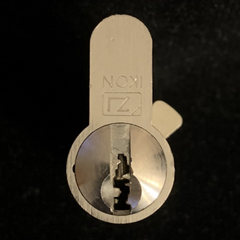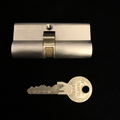IKON TK5: Difference between revisions
m (added photos) |
m (more images, Bo Widén mark) |
||
| Line 14: | Line 14: | ||
|spec_comptype = [[Pin_tumbler|Pin-tumbler]] | |spec_comptype = [[Pin_tumbler|Pin-tumbler]] | ||
}} | }} | ||
The '''TK5''' is a [[Pin_tumbler |pin-tumbler]] lock made by the German company [[IKON]]. | The '''TK5''' is a [[Pin_tumbler |pin-tumbler]] lock made by the German company [[IKON]]. The key bow bears the mark of Bo Widén. | ||
__TOC__ | __TOC__ | ||
| Line 24: | Line 24: | ||
File:IKON TK5 sidepins-Reinder.png |Finger pins from an IKON TK5. | File:IKON TK5 sidepins-Reinder.png |Finger pins from an IKON TK5. | ||
File:IKON TK5 sidepins with key-Reinder.jpg |A view of the finger pins rotated by the key. | File:IKON TK5 sidepins with key-Reinder.jpg |A view of the finger pins rotated by the key. | ||
File:IKON_TK5_key_bitting-Reinder.jpg |Bitting on an IKON TK5 key. | |||
</gallery></div> | </gallery></div> | ||
| Line 40: | Line 41: | ||
File:IKON_TK5_key_02_crop-SiskoSpaceman.png | File:IKON_TK5_key_02_crop-SiskoSpaceman.png | ||
File:IKON TK5 components-Reinder.png | File:IKON TK5 components-Reinder.png | ||
File:IKON_TK5_sidebar_channel-Reinder.png | |||
</gallery></div> | </gallery></div> | ||
Revision as of 22:13, 11 January 2023
IKON TK5
| IKON TK5 | |
 | |
| Name | IKON TK5 |
|---|---|
| Manufacturer | IKON |
| Lock Type | Cylinder |
| Lock Design | Pin-tumbler, Sidebar |
| Specifications | |
| # of Components | 9 |
| Component Type | Pin-tumbler |
The TK5 is a pin-tumbler lock made by the German company IKON. The key bow bears the mark of Bo Widén.
Principles of operation
The TK5 contains five traditional pin-tumblers at the top of the keyway. It also utilizes four finger pins that must be rotated and lifted to shear line in order for the cylinder to turn and open the lock.
Disassembly instructions
The TK5 is disassembled in the same way as other euro profile cylinders though extra attention must be paid to the sidebar and side pins during disassembly.
The use of a pinning shoe is the preferred method for disassembling a double euro cylinder. Another method is to use a segmented follower. The c-clips retaining both cores must first be removed and then both cores can be pulled out slightly in order to remove the center cam. One core should be rotated 30-45 degrees either clockwise or counter-clockwise -- once the cam is removed. This allows the core to be removed without driver pins entering gaps for the cam clutch. At that point, a segmented follower can be used to remove the core.
Locks not intended for installation and use can be disassembled in a quick but destructive procedure. The cylinder housing itself can be cut in the middle using a hacksaw or grinder. The cam will no longer be held in place and can be removed. The resulting two cut half euro cylinders can then be disassembled as outlined above.
Gallery
See also
| This article is a stub. You can help Lockwiki by expanding it. |








